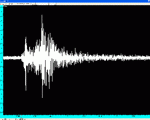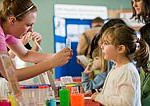Category Science & Technology
Engineering class infuses green ideas into local building projects
Earth Day is celebrated once a year, but University of Wisconsin–Madison civil and environmental engineering students are working to create plans that offer sustainable benefits for years to come.
Recent sightings: Seismometer image of Midwest earthquake
A UW–Madison geology department seismometer in Weeks Hall recorded the tremors of an earthquake that shook Madison and many other areas…
Visual Culture Center reaches across academic fields
Tucked away on the fifth floor of Memorial Library in a monastic faculty study room are the digs for the recently created Visual Culture Center. The limited square footage and unglamorous address, though, haven’t prevented center leadership, in just a few years, from developing and presenting a robust program of courses, research initiatives, presentations, lectures and conferences in a field of study that is the new kid on the academic block.
MSNBC science editor is visiting writer
Alan Boyle, science editor for MSNBC on the Internet, has been named the University of Wisconsin–Madison Science Writer in Residence for this spring.
Leading scientists to highlight annual stem cell research symposium
A cadre of North America's leading stem cell scientists will land in Madison April 16 for the third annual Wisconsin Stem Cell Symposium.
Bioethics forum to be an evolutionary affair
The 2008 International Bioethics Forum, to be held April 17-18 at Promega Corporation's BioPharmaceutical Technology Center (BTC) in Fitchburg, will delve into the science and controversies of evolution in the 21st Century.
Director cultivates a mile-high appreciation of Wisconsin
From his 12th-floor office, Sam Batzli has a view of nearby Lake Mendota and Madison's downtown punctuated by the state Capitol. But instead of looking out the window, Batzli looks at Madison and the rest of Wisconsin from much higher altitudes.
WAGE awards three research collaborative grants related to globalization
The University of Wisconsin–Madison Center for World Affairs and the Global Economy (WAGE) announces the three winners of its research collaborative competition, each receiving $100,000 during a three-year period.
Negligent, attentive mouse mothers show biological differences
In mice, child neglect is a product of both nature and nurture, according to a new study. Researchers from the University of Wisconsin–Madison describe a strain of mice that exhibit unusually high rates of maternal neglect, with approximately one out of every five females failing to care for her offspring.
MSNBC science editor is visiting writer
Alan MSNBC science editor is visiting writer, science editor for msnbc.com, has been named the Science Writer in Residence for this spring.
Recent sightings: Science Expeditions 2008
A UW–Madison student demonstrates to Natalie Rodenkirch how DNA is isolated in the lab at an activity booth during the “Science is…
Money doesn’t grow on trees, but gasoline might
In 2003, University of Wisconsin–Madison graduate student George Huber and colleagues made hydrogen from plant sugars using nickel-tin alloy catalysts in the lab of Chemical and Biological Engineering Professor James Dumesic.
Using street theater to channel the lessons of molecules
A novel project by a collaboration of scientists and educators from the University of Wisconsin–Madison and the Madison Area Technical College (MATC) is making molecules and atoms the stars of a project to use theater to teach children the basics of science.
UW study shows pomegranate juice may help fight lung cancer
Researchers are adding to the list of cancer types for which pomegranates seem to halt growth. A recent study at the University of Wisconsin–Madison using a mouse model shows that consuming pomegranates could potentially help reduce the growth and spread of lung cancer cells or even prevent lung cancer from developing.
Christopher and Dana Reeve Foundation chair to speak at Stem Cell Summit
Peter D. Kiernan, III, chair of the Christopher and Dana Reeve Foundation, will provide the keynote address at the World Stem Cell Summit Sept. 22-23, 2008, at the Alliant Energy Center in Madison.
From stained glass to stem cells, science shines on campus April 5
The University of Wisconsin–Madison will offer a science smorgasbord to the public at the sixth annual Science Expeditions on Saturday, April 5.
From stained glass to stem cells, science shines
UW–Madison will offer a science smorgasbord to the public at the sixth annual Science Expeditions on Saturday, April 5.
WARF, UW–Madison influenza researcher, Lentigen agree to donate technology
The University of Wisconsin–Madison has received a $1.3 million grant from the Bill & Melinda Gates Foundation to support research aimed at understanding the molecular features that lead to influenza pandemics. UW–Madison will collaborate with Maryland-based Lentigen Corp. on the project.
Study shows compassion meditation changes the brain
Cultivating compassion and kindness through meditation affects brain regions that can make a person more empathetic to other peoples' mental states, say researchers at the University of Wisconsin–Madison.
For stem cell scientist James Thomson, discovery trumps fame
The UW scientist who first brought stem cells into the scientific spotlight — a discovery that sparked a volatile debate of political and medical ethics — doesn’t seek fame for himself. So when you are the go-to guy for everybody who wants access to James Thomson, a man who’d much rather be in the lab than in the media’s glare, you learn to say no more often than you’d like.









